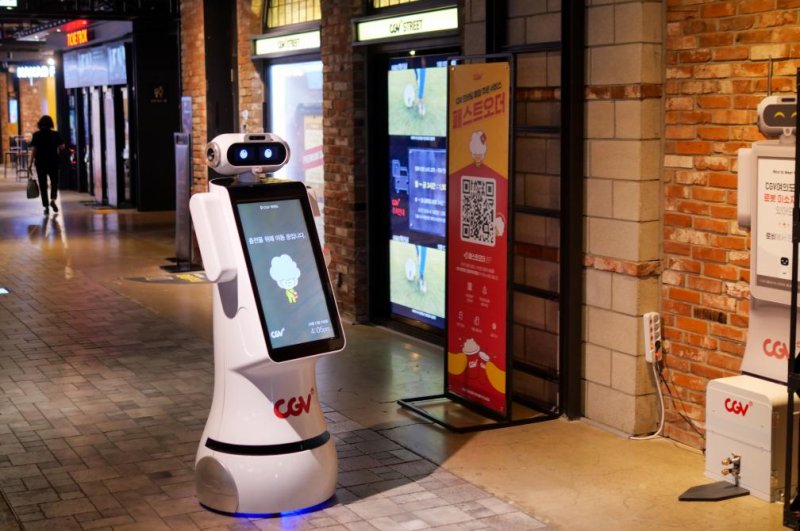1 of 7 | "Checkbot," an AI-powered robot, takes tickets, answers questions and gives directions at CGV's contact-free "untact" cinema in Seoul. Photo by Thomas Maresca/UPI
SEOUL, May 27 (UPI) -- As South Korea continues to loosen its social distancing guidelines amid the COVID-19 outbreak, hard-hit movie theaters are trying to find ways to lure customers back.
For theater chains such as CGV, the country's largest, an automated, contactless cinema experience could be the key to revitalizing an industry that has seen empty seats during the pandemic.
CGV, owned by South Korean conglomerate CJ, is running a trial of a contact-free theater at a branch in Seoul's Yeouido business district and it offers a glimpse of what the moviegoing future may look like.
The system, which has been in operation since April 20, eliminates virtually all face-to-face interactions between customers and staff. Patrons buy tickets at touchscreen kiosks or via a smartphone app and then scan them at QR code readers installed at the entrance to each theater.
A five-foot-tall, AI-powered "Checkbot" robot with a large front-mounted screen wheels around the cinema, scanning tickets, answering questions using voice recognition technology and leading customers to the restroom or their theater.
The "Popcorn Factory" self-service area features vending machines that provide popcorn, hot dogs and sodas. Other snacks such as nachos, grilled squid and beer can be ordered by app or kiosk. They are then placed by a staff member in a numbered pickup box that the customer opens with a special code. The theater even authenticates parking automatically.
Interest in contactless services -- known as "untact" locally -- has grown dramatically during the COVID-19 outbreak, as online shopping and food delivery usage has spiked and the government Is looking to deregulate telemedicine.
Theater chain Lotte also introduced a version of contactless services to roughly two dozen of its branches in late April.
The changes that CGV is trying out in Yeouido will likely become a part of everyday life going forward, said Lee Jung-woo, manager of the theater chain's smart innovation team.
"The COVID-19 outbreak has raised the need for untact services for customer safety in all industries, and the non-face-to-face needs of movie theater audiences are expected to become part of the new normal," Lee said.
The industry is certainly in need of a boost as ticket sales have plunged during the spread of the coronavirus, particularly after a major outbreak in late February that was centered around the southeastern city of Daegu.
The government never officially mandated that movie theaters had to close, but chains shut down many branches due to lack of customers.
South Korea's box office fell by 65.3 percent over the first quarter of the year compared to the same period last year, according to data from firms S&P Global Market Intelligence and OPUSData.
Even as the country has largely managed to contain the spread of COVID-19 through an aggressive testing and tracing program, movie patrons have been slow to return.
The number of moviegoers fell to a record-low in April, according to the Korean Film Council. Only 970,000 tickets were sold nationwide, a drop of 92.7 percent from a year ago.
After a brief surge in early May over a long holiday weekend, sales have remained flat for the past three weeks, the Korean Film Council reported Tuesday, with theaters suffering from a lack of new releases and lingering customer hesitation. The top-grossing film in theaters over the weekend was a 2017 retread, the Hugh Jackman feature The Greatest Showman.
Lee said the new untact theater hasn't yet drawn nervous customers back.
"There isn't a significant change in the occupancy rate of seats," he said. "However, we've been receiving positive feedback."
Some moviegoers at the near-empty Yeouido theater on a recent weekday evening said they had not been expecting the new automated services.
"It's my first time back to see a movie since the coronavirus outbreak and I was quite surprised at first," said 22-year-old Kim Song-eun. "I didn't expect such a radical change."
Kim said she was impressed with the ease of use of the new system and thought it would be a factor in her choice of theaters in the future.
"It would be good to maintain this system going forward," she said. "I'd definitely choose an untact theater over a normal one if it was not too far away."
Other customers said they felt safer going to the contactless theater.
"The coronavirus spreads easily through face-to-face contact," said 20-year-old Hong Min-seo. "The untact theater is more convenient and It's less stressful for customers and the staff."
In addition to the automated services, theaters are routinely disinfected and seating is spaced out by alternating rows to maintain social distancing, Lee said.
This Yeouido location is just the start, Lee added. Depending on customer response, it may become the standard platform for all branches of the chain.
"We are considering expanding untact cinema to all theaters in the future," he said. "It is expected to enhance customer convenience and streamline the operation of the theater."















